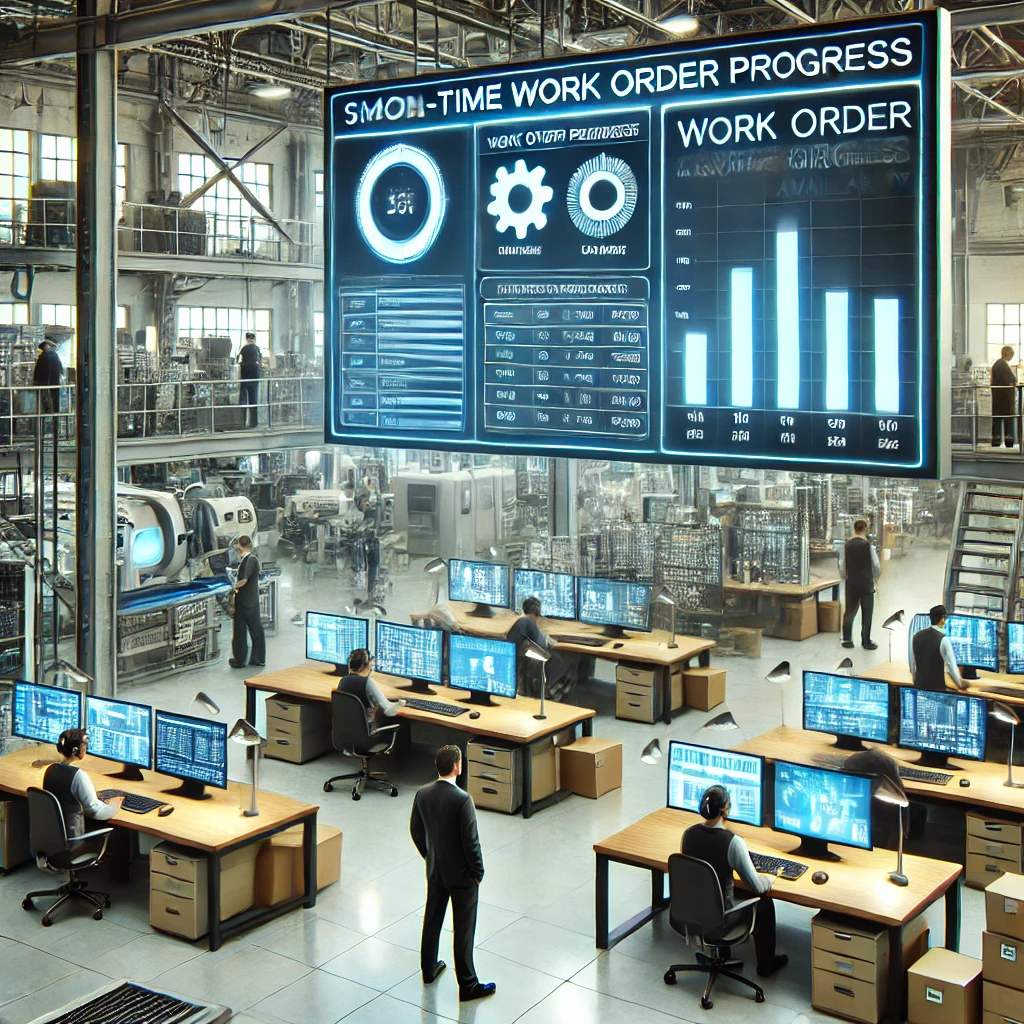Managing work orders effectively is crucial to ensuring that production runs smoothly and efficiently in a manufacturing environment. Work order management involves tracking production jobs, assigning tasks, and ensuring that the necessary materials and labor are available to complete orders on time. Without proper management, work orders can pile up, leading to delays, increased costs, and inefficiencies.
In this article, we’ll explore how to manage work orders in manufacturing to improve productivity, reduce downtime, and ensure that production goals are met consistently.

What is Work Order Management in Manufacturing?
A work order is a document that outlines the steps and resources required to complete a specific production job. It includes information such as the materials needed, labor requirements, production timelines, and quality control steps. Work orders are essential for tracking the progress of each job and ensuring that production is completed efficiently.
Work order management is the process of organizing, scheduling, and tracking these work orders from the moment they are created until the job is completed. This includes monitoring the status of each job, assigning tasks to the right personnel, and ensuring that materials are available when needed.
Effective work order management helps manufacturers:
- Track the status of jobs in real time.
- Allocate resources more effectively.
- Ensure timely completion of production jobs.
- Reduce downtime and bottlenecks.
- Maintain product quality by tracking key metrics.
Steps to Manage Work Orders in Manufacturing
To manage work orders effectively, manufacturers must have a clear and organized process in place. Here’s a step-by-step guide on how to manage work orders in manufacturing:
1. Create Detailed Work Orders
Each work order should include all the necessary details for completing the job, including materials, labor, timelines, and any quality control requirements. The more detailed the work order, the easier it is for production teams to complete the job accurately and efficiently.
2. Prioritize Work Orders
Not all work orders are created equal. Some jobs may be more time-sensitive or have higher priority due to customer demands. It’s important to prioritize work orders based on deadlines, material availability, and production capacity to ensure that the most critical jobs are completed first.
3. Allocate Resources Efficiently
Resource allocation is critical to the success of any work order. This includes assigning the right personnel, ensuring that materials are available, and scheduling machine time. Using ERP systems or work order management software helps automate this process, reducing manual errors and ensuring that resources are used efficiently.
4. Track Progress in Real Time
Work orders should be tracked in real time to monitor progress, identify potential delays, and make adjustments as needed. Real-time tracking helps manufacturers respond quickly to changes in demand, material shortages, or machine breakdowns, minimizing downtime.
5. Ensure Quality Control
Quality control is essential in manufacturing, and work orders should include steps for ensuring that products meet quality standards. By integrating quality control into the work order management process, manufacturers can catch defects early and make corrections before products reach the customer.
6. Close Work Orders Upon Completion
Once a work order is completed, it should be closed out in the system. This includes updating the status of the job, recording actual material usage, and documenting any issues that occurred during production. Closing work orders helps maintain accurate records and provides valuable data for future production planning.
Benefits of Effective Work Order Management
Implementing an effective work order management system offers several benefits that can improve overall production efficiency and reduce costs:
1. Increased Productivity
By organizing and tracking work orders in real time, manufacturers can ensure that jobs are completed on time and resources are used efficiently. This leads to increased productivity and faster production times.
2. Reduced Downtime
Real-time tracking of work orders helps manufacturers identify potential delays or bottlenecks early, allowing them to take corrective action before downtime occurs. This minimizes disruptions and keeps production running smoothly.
3. Improved Resource Allocation
Work order management systems help manufacturers allocate labor, materials, and machinery more effectively, reducing waste and ensuring that resources are used where they’re needed most.
4. Better Quality Control
Integrating quality control into the work order process helps manufacturers maintain high product standards and reduce defects. This leads to improved customer satisfaction and fewer returns or rework.
5. Enhanced Communication
With a centralized system for managing work orders, all teams have access to the same information, improving communication between departments and ensuring that everyone is aligned on production goals.
How Syncratech’s Work Order Management Solutions Can Help
At Syncratech, we understand the challenges manufacturers face in managing work orders. Our tailored Work Order Management Solutions provide manufacturers with the tools they need to track jobs in real time, allocate resources efficiently, and ensure that production runs smoothly.
Here’s how our solution can benefit your business:
- Real-time tracking of work orders to monitor progress and prevent delays.
- Automated resource allocation to reduce manual errors and improve efficiency.
- Integration with production planning to streamline operations and ensure that jobs are completed on time.
- Detailed reporting tools to track performance, identify bottlenecks, and optimize production.
By implementing Syncratech’s Work Order Management Solutions, manufacturers can improve productivity, reduce downtime, and ensure that production goals are met consistently. Visit our homepage to learn more.
FAQs About Managing Work Orders in Manufacturing
1. How can work order management systems improve production efficiency?
Work order management systems automate the process of creating, prioritizing, and tracking work orders, helping manufacturers allocate resources more efficiently and complete jobs on time.
2. Can work order management systems integrate with ERP systems?
Yes, most work order management systems can integrate with ERP systems, providing a centralized platform for managing all aspects of production, from resource allocation to financial tracking.
3. How does real-time tracking help with work order management?
Real-time tracking allows manufacturers to monitor the progress of work orders, identify potential delays, and make adjustments as needed to keep production on schedule.
4. What are the key features of a work order management system?
A work order management system typically includes features such as work order creation, real-time tracking, resource allocation, quality control, and reporting tools to help manufacturers streamline production.
Final Thoughts
Managing work orders effectively is essential for ensuring that production runs smoothly and efficiently in a manufacturing environment. By implementing a work order management system, manufacturers can streamline their operations, improve productivity, and reduce costs.
At Syncratech, we offer customized Work Order Management Solutions designed to help manufacturers optimize their production processes and meet their goals. To learn more about how our solutions can benefit your business, visit our homepage today.



